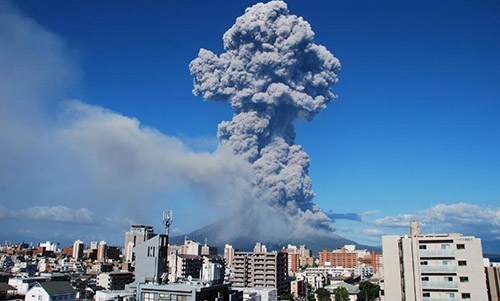Volcano in southern Japan erupts: weather agency
A volcano in southern Japan dramatically erupted Friday, with television footage showing fiery bursts of super-hot rock and ash rushing down its slopes, though authorities said it posed no immediate danger to populated areas.
Japan, with scores of active volcanoes, sits on the so-called Pacific "Ring of Fire" where a large proportion of the world's quakes and volcanic eruptions are recorded.
One of the most famous of the country's volcanoes is 1,117-metre (3,665-foot) high Sakurajima, which sits in a scenic bay on the southern island of Kyushu, and erupted at 6:56 pm (0956 GMT), the Japan Meteorological Agency said.
The blast spewed out large rocks, the agency said, warning that debris and pyroclastic flows -- a super-hot and fast-moving mixture of gases and rock fragments -- could reach as far as two kilometres (1.25 miles) away.
The spectacle of the eruption was captured in footage shown on national broadcaster NHK, with the orange colour of the flows shining brightly in the darkened sky.
While local police received no immediate report of damage or injuries among the approximately 4,000 residents who live in the immediate surroundings, they were still rattled by the power of the eruption.
"There were rising pillars of fire, and flickering lights like lightning," said a local resident who told NHK that he witnessed the scene from a window.
"What I worry is what will happen next."
In September 2014, Mount Ontake in central Nagano prefecture violently blew up, leaving 58 people, many of them hikers, dead and five others missing in the nation's deadliest eruption for almost 90 years.
The weather agency on Friday raised Sakurajima's alert status to Level 3, which bans entry onto the mountain, from Level 2, which limited people from going near the vents.
-'Exercise caution'-
The elevated level, however, stopped short of urging local residents to prepare for possible evacuation, according to the agency.
"Sakurajima's volcanic activity could increase," a weather agency official told a press briefing held shortly after the eruption.
"Those who live downwind should use caution, as ash could travel far," he added. "If it rains, we ask people to exercise caution for mudslides."
Sakurajima last experienced a major eruption in 2013, spewing an ash plume up to 5,000 metres into the air, causing damage but no major injuries.
The eruption did not affect the operation of the closest nuclear reactors, sitting some 50 kilometres (31 miles) from the mountain, media reports quoted operator Kyushu Electric as saying.
Sakurajima, formerly an island but due to previous eruptions is now attached to a peninsula, frequently spits out smoke and ash and is a major tourist attraction.
It lies about 12 kilometres across the bay from the main part of the city of Kagoshima, with a population of more than 600,000 people.
Experts said that as the eruption happened away from residential areas it was not expected it to have a significant impact.
But its suggests a possible increase in frequency, though it is unlikely that a "massive" eruption is imminent, Masato Iguchi, professor at Kyoto University's Sakurajima Volcano Research Center, told NHK, but stressed caution was warranted.
"We need to monitor the volcano carefully," he said.
The eruption nevertheless highlighted concerns that the volcano could threaten the nearby Sendai nuclear reactors, according to campaign group Greenpeace.
Kyushu Electric conducted "flawed volcano risk analysis" that "underestimated the potential impacts of ash deposits on operations of the Sendai nuclear reactors following a major volcanic eruption," Greenpeace said in a statement, released shortly after Friday's eruption.
The two reactors restarted in August and October, ending a two-year hiatus in nuclear power generation after all of Japan's dozens of reactors were shut down in the aftermath of the March 2011 huge earthquake and tsunami that caused a disastrous meltdown at the Fukushima nuclear power plant.
Photo: www.ngrguardiannews.com
Related Posts

